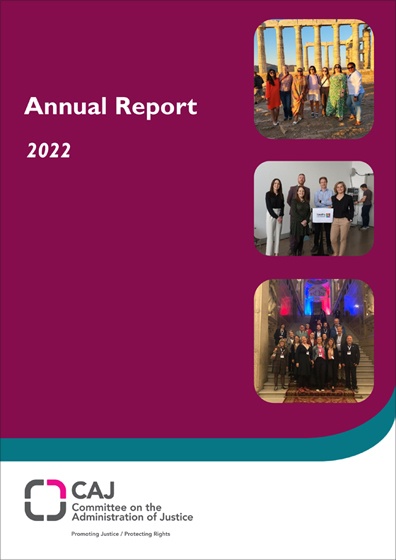Introduction: In introducing an account of another year’s activism for human rights, it is hard not to convey a feeling of gloom. In spite of the chaos at Westminster, successive Conservative administrations have found the time to threaten the rule of law in this region in a determined way. We have the destruction of the Human Rights Act in the so-called “British Bill of Rights” bill, the ending of all recourse to law in respect of the Troubles in the Northern Ireland Troubles (Legacy and Reconciliation) Bill, and the Ministerial power grab which breaches international law of the Northern Ireland Protocol Bill. At the same time, a faction of local politicians is preventing the operation of devolution in protest against their isolated and idiosyncratic perception that the Protocol threatens the Union.
Our people are facing an unprecedented cost of living crisis, the health service is visibly failing, and public services in general are creaking. Meanwhile, the ominous drum beat of the approaching climate catastrophe gets louder. There is much to be worried and fearful about; but there are also grounds for hope. We know how to meet, confront, and reverse these threats to our society and wellbeing. There is no doubt that a human rights approach can show a principled and practical way through these difficulties. It is not just that human rights emphasise the dignity and equality of all human beings but that the increasing sophistication of human rights standards, principles, and law also offer a practical way forward. We are able to develop quite comprehensive policy platforms in areas as disparate as immigration, dealing with the past, hate expression, and poverty. Principles such as proportionality, progressive fulfilment, and focusing on the most deprived help in decision making with a human rights framework.
Moreover, the utility of a human rights approach is being more widely acknowledged. Discussion on policing now takes place almost exclusively within the parameters of human rights. Public authorities are more widely recognising the significance of equality and human rights. Political parties are also much more comfortable in making overt reference to human rights and equality in their electoral manifestos. When it came to the report of the Assembly Ad Hoc Committee on a Bill of Rights, four out of five of the major parties supported a Bill of Rights for Northern Ireland.
There is therefore significant party political support for a human rights approach. In fact, the reality is that the big majority of voters in the May election backed parties that in turn support the Bill of Rights. There is a progressive majority both at Stormont and in the electorate as a whole. To a very real extent, therefore, we have won the argument – the task is to translate that into policy and legislative change.
There is no reason for complacency – in messaging or in lobbying and advocacy. Nonetheless, we are not faced with an apparently hopeless task – we know what needs to be done and how to do it. The only issue is creating the coalitions, in political and civil society, that are willing and able to carry the task through. In so doing, we must look primarily to ourselves, to our local community, divided as it may be. If we look East, we see many allies in civil society in the three nations and also in political power in Wales and Scotland. We also see a lack of knowledge and interest in Northern Ireland and, at worst, the deliberate use of our issues in political battles that have little to do with us. If we look South, we also see many allies, but together with a certain complacency and lack of understanding.
This perspective has nothing to do with the constitutional question. Whatever might be the future decision of the people of this island on constitutional matters, there will be no knight in shining armour riding from East or South to make all our problems go away. That is our task – our solutions must be based in this region, regardless of whatever greater whole people envision NI being part of in future. In CAJ, we are convinced that those solutions must be based on human rights.
Our role will be to continue making the arguments, and carrying out the necessary research and the policy development, to turn international human rights standards into practical solutions to local problems. We must then disseminate the results throughout civil and political society, winning people at all levels to see the benefit of a carefully constructed and developed human rights approach. It is in the course of that work that we will realise our vision of a peaceful society based on human rights and equality.
Download the full report via this link.
